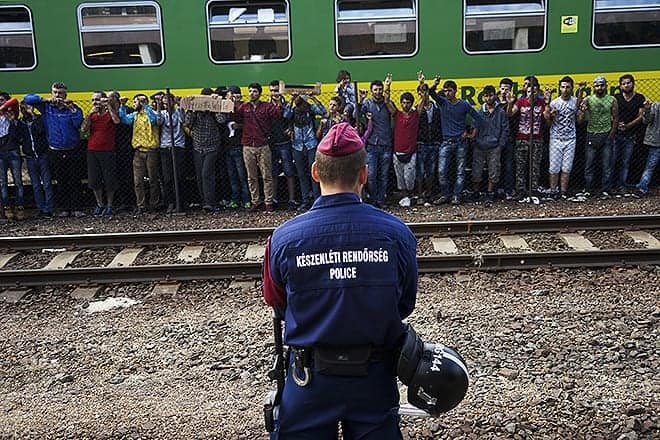The refugee crisis: a balancing act

 Author: nicholas giokas – contributor
Author: nicholas giokas – contributor
I hate using ‘the middle road is the best one’ logic. However, when it comes to the debate surrounding the refugee crisis, I have to take that stance. You see, the issue is that people are either refusing to see the ‘forest for the trees’ or the ‘trees for the forest.’ In other words, the focus of people’s viewpoints are either getting too narrow or too broad. On the one hand, people are too focused on the issue of Syrian and Iraqi refugees, that they refuse to acknowledge how this shapes and is shaped by the wider immigration debate. On the other are those that are taking a universal viewpoint, looking at immigration as either net good or bad overall, while ignoring the differences that context makes.
First off, let’s look at the narrow focus on the refugee crisis. Those on both sides of the debate are looking at this case from the point of view that it is the ethical merits of accepting these refugees that need to be tested. From the left, you hear calls for compassion and from the right, calls for caution. This is a necessary debate in any nation. How do we balance compassion for our fellow man and security for our citizens? The issue is that nothing will be decided by taking this format. It quickly devolves into accusations of heartlessness from the left and fecklessness from the right. The discussion that needs to happen is one where we broaden the overall scope of the debate and establish where the baseline is. Now, facts dictate that immigration is an overall long term good. The populist left and right will dispute this assertion. The problem is that, again, they’re looking too narrowly at the issue, going case by case. But if we establish our logical baseline by looking at immigration overall, we see that it boosts GDP, stabilizes population growth, and creates diversity which fuels innovation and growth. In a broad sense, immigration can be an economic and social benefit.
Now the discussion becomes one centered on the issues of ‘how much’ and ’what kind’ rather than immediately jumping to case study. Now, when we say ‘how much’ today we already know that things like quotas on visas and citizenship make things needlessly inefficient and ineffectual. So, we need to keep the system dynamic by relying on a general framework. The thing is that the country being immigrated to has to have enough of an understanding of the immigrant. I’ve personally dealt with this with the PRC’s visa system recently. Essentially, the state has to know who you are and whether you carry any potential risks. They also have to be able to loosely verify your status with your visa or path to citizenship. Now, this is where we can start to reach consensus from both sides. The system has to be able to effectively ensure that ‘bad eggs’ can be swiftly deported and that there isn’t too much burden placed on the forms of government in charge of immigration. So, now we can start discussion over the Syrian refugees in a more effective way. Essentially, how inefficient are we willing to let the overall system be due to a sudden surge of people? Furthermore, where do we focus the remaining efficiency? Do we focus on integration of the surge of immigrants or on vetting them? Of course, none of this is zero-sum, but it’s a far more productive discussion than simply slinging mud.
Of course, I’d be remiss if I focused the discussion firmly on the immigration system. A wider view is good and all, but there needs to be emphasis on the facts as well. With discussion of the Syrian refugees, it’s important to note that Greece isn’t France, which isn’t Canada. It’s nice to generalize the debate, but one has to realize that different national contexts matter a great deal. The refugee discussion is different in Europe than it is in Canada, because in Canada, as much as we like to talk about multiculturalism, we’re fairly homogenous. The refugee debate in Europe is more focused on shifts in demographics affecting social dynamics than it is in Canada, where it’s more centered on generalized moral responsibility. It’s also important to note that some nations are bearing the burden far more than others. So, I return to the question of efficiency I stated before: how do we guarantee Pareto Efficiency among all the concerned parties and what is the best way to get there? Furthermore, how do we quantify Pareto Efficiency in the context of social values? Well, first off, it is necessary for richer countries to take on more refugees than poorer ones. However, it’s also important to make sure that the demographic shifts are balanced enough so that the identity of the nation down to the locality is not overly effected. This means that the threshold would, in some ways, be higher for some parts of the Muslim world vis-à-vis more homogenous parts of Europe.
Now, this op-ed may seem a tad detached or cold in its arguments, but I think it’s absolutely vital that these kinds of arguments are brought up in the context of political debate. See, the biggest failing in political discourse is that ‘winning’ the argument at any cost is almost always valued more than reaching consensus or a conclusion, even when it means polarization and entrenchment. I’ll admit, I fall victim to this more often than I’d like. But, it’s important that we attempt to balance out the political discussion and refuse to do the easy thing by falling back on snappy one-liners. In the context of the refugee crisis, and the overall immigration debate, people’s lives are the subject of discussion, so we should respect that.









